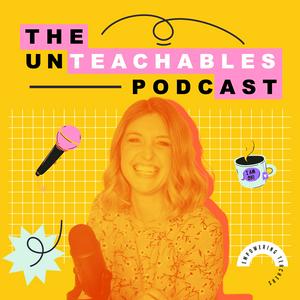What if I told you that you could build connection, boost buy-in, reset the vibe, AND reduce low-level behaviour… in five minutes flat?
No prep. Just you, your class, and a little bit of magic. ✨
In this episode, I’m giving you a front seat to 10 of my favourite grab-and-go community builders, the ones that get students laughing, talking, connecting, and (without even realising it) building the kind of classroom culture that makes behaviour easier.
A couple of episodes ago, we talked about the foundations of community, routines, predictability, felt safety, clarity, differentiation. All the behind-the-scenes cogs that make your classroom feel like a home.
Today?
We’re getting tangible (and fun as heck).
Because here’s the thing… Community building isn’t just a “start of the year” gimmick.
It’s how you:
Reset a tense class
Fill five minutes of dangerous dead-air time
Reconnect when you’re feeling resentful
Help students feel safe enough to share
Invest in their emotional piggy bank (so you can make withdrawals later)
And yes — it also helps you fall back in love with your class when things feel a bit… blah.
So if you’ve ever thought:
“They don’t deserve fun right now.”
“They should just come in and learn.”
“I don’t have time for this fluff.”
This episode might lovingly challenge that. 💛
Because connection isn’t fluffy. It’s proactive classroom management.
Inside This Episode:
Here are the 10 no-prep community builders I walk you through:
Transformer Triangles – Turn a simple triangle into something creative in 2 minutes. Gallery walk optional. Laughter guaranteed.
The Stare Down – Face off, no touching, no breaking eye contact. First to laugh loses. (Use your professional judgment with this one!)
Teacher Portrait – Students draw you. Risky? Yes. Hilarious? Also yes. (PS: Only if you’re not sensitive about your ears like I was.)
Class Debate – Throw out a juicy “Would You Rather” or controversial question and let them argue it out.
Racing Rhymes – Fast-paced rhyming battle in a circle. If you can’t rhyme, you’re out. Chaos in the best way.
Coin Toss Battle – Heads or tails showdown. Whole-class energy. No gambling involved, promise.
Sticky Slam – Interview your partner for 1 minute, then write down everything you remember. Fact-check. Compete. Connect.
Count to 20 – Whole-class challenge: count to 20, but only one person speaks at a time. Two at once? Back to one. Frustrating. Brilliant.
What’s Changed? – One student leaves, something in the room changes, they guess what it is.
Apple Pie – Guess who said the mystery word in a disguised voice. Year 11s LOVE this one.
RESOURCES MENTIONED
Have a question, comment, or just want to say hello? Drop us a text!
RESOURCES AND MORE SUPPORT:
Shop all resources
Join The Behaviour Club
My book! It’s Never Just About the Behaviour: A holistic approach to classroom behaviour management
The Low-Level Behaviour Bootcamp
Free guide: 'Chats that Create Change'
Connect with me:
Follow on Instagram @the.unteachables
Check out my website


